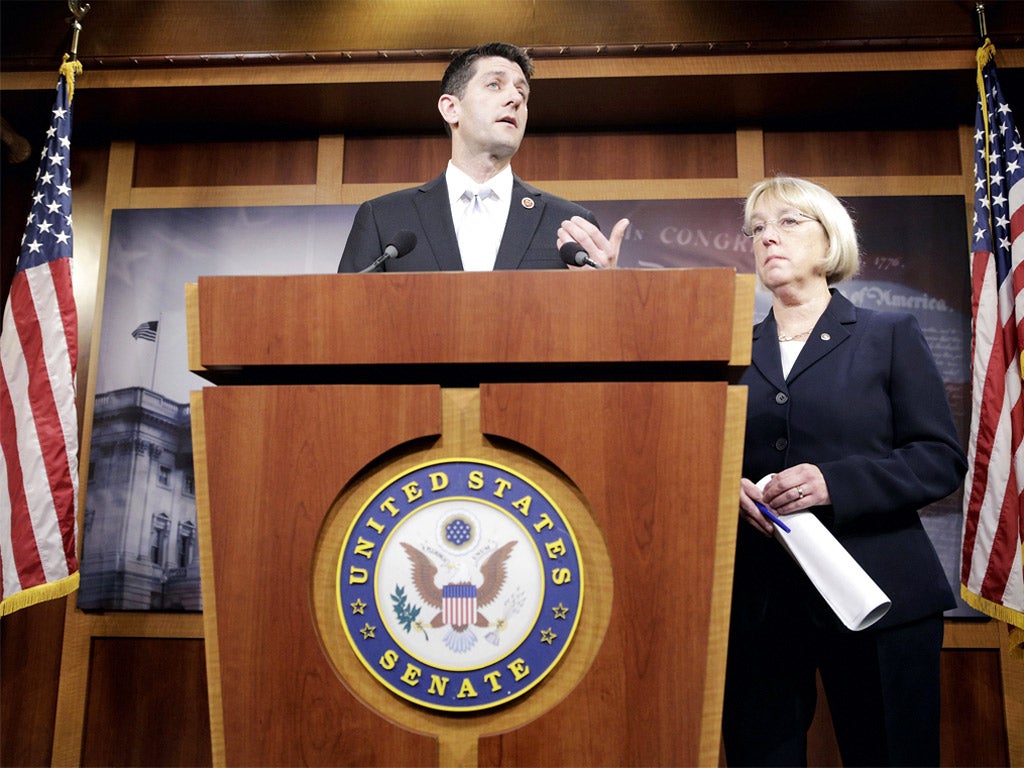America gets a budget deal – just don’t mention tax and welfare
Congress to avoid another federal shutdown with bipartisan pact

Your support helps us to tell the story
From reproductive rights to climate change to Big Tech, The Independent is on the ground when the story is developing. Whether it's investigating the financials of Elon Musk's pro-Trump PAC or producing our latest documentary, 'The A Word', which shines a light on the American women fighting for reproductive rights, we know how important it is to parse out the facts from the messaging.
At such a critical moment in US history, we need reporters on the ground. Your donation allows us to keep sending journalists to speak to both sides of the story.
The Independent is trusted by Americans across the entire political spectrum. And unlike many other quality news outlets, we choose not to lock Americans out of our reporting and analysis with paywalls. We believe quality journalism should be available to everyone, paid for by those who can afford it.
Your support makes all the difference.Americans woke up to an unusual show of bipartisan co-operation on Capitol Hill after politicians agreed a two-year budget deal aimed at breaking a damaging cycle of shrill political battles over the country’s finances, intended to avoid a repeat of the embarrassing government shutdown this year.
However, while trumpeting a ceasefire over government spending, leaders failed to agree on proposals to extend support for the more than one million people who are set to lose their unemployment benefits later this month.
Democrats and Republicans presented the deal that was agreed late on Tuesday evening as an imperfect but important compromise that would allow Congress to function with less political brinkmanship, staving off the prospect of another government shutdown early next year and providing s safeguard for the US economic recovery.
The pact, worth around $85bn (£52bn), does not tackle the thorny business of reforming costly government welfare programmes, nor does it address the question of overhauling the tax code. Proponents from both sides argued the agreement would ensure that the national government would continue functioning while negotiations over the outstanding issues progress.
“We understand that in this divided government, we’re not going to get everything we want,” said Paul Ryan, the Republican chair of the House Budget Committee who led the talks on behalf his party.
President Obama struck a similar tone, acknowledging the limits of the agreement but welcoming the prospect of a more orderly budget process. “This agreement doesn’t include everything I’d like – and I know many Republicans feel the same way,” he said. “But it’s a good sign that Democrats and Republicans were able to come together and break the cycle of short-sighted, crisis-driven decision-making to get this done.”
If approved by Congress, the deal would finance the federal government until late 2015 and reduce the size of the automatic spending cuts known as the sequester by around $63bn over the course of the next two years. To pay for that, higher revenues will be sought from other sources such as air passenger fees. Newly hired federal workers will also take a hit, as they’ll be asked to cough up more in pension contributions. By introducing new cuts further down the road, the deal would also trim the US deficit over the course of the next decade by $23bn, a nod to conservative demands.
But the pact is silent on the debt ceiling (the congressionally mandated limit on the amount of money that the Treasury can borrow at any given time), meaning that while the federal agencies might not shut down next year, disagreements between the two parties could yet trigger another damaging showdown over government finances in Washington.
Nor does the agreement deal with what until recently was a key Democratic demand: extending emergency federal benefits for Americans who have been out of a job for over six months. As things stand, around 1.3 million people are at risk of losing their benefits when an emergency programme expires over the holiday period, on 28 December.

Earlier, some Democrats had pressed for a one-year extension to the programme. But the Republican leadership is said to have baulked at the $25bn price-tag.
While some Democrats – particularly those with large numbers of federal workers in their district who would have an easier time next year if the agreement is implemented – welcomed the pact, others voiced concerns about the lack of provisions to help out the long-term unemployed. Speaking to C-Span, John Lewis, a Democratic House member from Georgia, said: “I don’t want this budget to be done on the backs of the people who are most vulnerable.”
Another Democrat in the House, Joe Crowley of New York, told Politico that the deal on the table was not “representative of the value of our whole conference.”
The leader of the Democratic minority in the House, Nancy Pelosi, did not give a firm answer on whether she would support the agreement, saying, “We haven’t even seen the final product”. However, she added that “it’s unconscionable that we could consider leaving Washington DC [for the holidays] without extending these benefits.”
There was also some opposition among conservatives, with right-wingers challenging any deal that reduces spending cuts. Tim Huelskamp, a Republican Congressman allied with the Tea Party movement, signalled he was against a deal, telling The Washington Post: “Republicans said they wanted to reduce spending; this bill does exactly the opposite. I don’t think it’s a good deal.”
The conservative group Heritage Action for America also weighed in against the agreement, calling it “a step backward.” “Some are heralding the agreement as an indication politicians can put aside their petty differences and achieve something,” the group’s chief executive, Michael Needham, wrote in USA Today. “In the coming days, members of Congress will have to explain to their constituents what exactly they achieved by increasing spending, increasing fees and offering up another round of promises waiting to be broken.”
Join our commenting forum
Join thought-provoking conversations, follow other Independent readers and see their replies
Comments